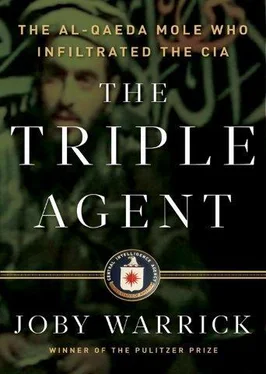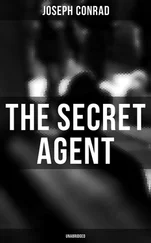“Dane, are you safe?” she asked. She knew his reply before the words were uttered.
“Yeah, babe,” is all he would say.
Humam al-Balawi scanned the line of cars and taxis, crutch in hand, looking for his ride. It was midafternoon on December 30 when he finally arrived at Ghulam Khan, the only border crossing between Pakistan’s North Waziristan Province and the Islamic Republic of Afghanistan. Balawi was now more than twenty-four hours late for his meeting at Khost. Would anyone still be waiting for him?
The checkpoint, a cluster of mud-brick buildings on the Pakistani side, was manned by a handful of nervous guards with rifles and one antique machine gun with its barrel pointed toward Afghanistan. Passengers crossing to the Afghan side queued up here for taxis and private cars that would ferry them across the dividing line, a mile farther up the road, and to points as far west as Kabul. The line inched forward as Balawi wavered, watching the guards in their heavy coats as they peered into trunks, checked IDs, and picked through suitcases, looking for drugs or weapons.
Physically Balawi was a wreck. His injured leg still ached, and he had spent a jarring afternoon on the rutted road from Miranshah with thirty pounds of metal and explosives strapped to his chest. Now he waited in line for a border check, clutching a Jordanian passport with a Pakistani visa that had expired seven months earlier, and wearing a bomb under his shirt. The line lurched forward again.
Balawi looked up to see someone waving to him from the cluster of taxis waiting for passengers to Afghanistan. He was tall, well built, and Afghan, to judge from his clothes. When the two were close enough to speak, he greeted Balawi softly in Pashtun-accented English.
He opened the door of a white sedan, and Balawi climbed inside. The car started and edged forward into the queue of westbound vehicles. With a flash of the driver’s ID card, the vehicle was waved through. It rumbled along a steep incline for several minutes until at last it passed the boundary marker and was in Afghan territory.
The driver mumbled a few words into his cell phone, and the two men began an hour-long descent from the mountains to the semiarid valley that is home to most of Khost Province’s one million inhabitants. The road snaked precariously along steep ridges and switchbacks here, and drivers were forced to swerve or brake to avoid craters gouged by flash floods or bombs.
The Afghan officer sat alone in the front, with his passenger directly behind him. Arghawan was one of the CIA’s favorites at Khost, hardworking and as dependable as the morning sun. Just thirty, with hazel eyes and a neatly trimmed beard, he had been an early graduate of Afghanistan’s indigenous Special Forces school and had risen to head the detachment of Afghan guards employed by the CIA to help protect the base. It was a measure of the agency’s trust that he was sent alone to pick up such an important source. An American might have begun the debriefing in the car, after a quick pat-down for weapons. But an American would not have been able to slip in and out of Pakistan as easily as a Pashtun speaker from outside Khost.
Just at the point where the hilly terrain finally leveled out, the car veered off the highway into a small village. Arghawan drove slowly along an unpaved street, looking for something, then pulled up next to a red Subaru hatchback that was idling behind a mud wall with a man sitting at the wheel. The two drivers got out of their cars and exchanged words; then Arghawan returned and opened the rear door next to Balawi.
Get out. We’re switching cars , he said. It’s a precaution .
Soon the two men were under way again, moving faster now on flat roads lined on either side by irrigated fields. It was already 4:15 P.M., nearly twenty-six hours after Balawi’s scheduled appointment at Khost.
The initial delay had been the Taliban’s fault. The CIA had expected Balawi to arrive in the Pakistani town of Miranshah on Tuesday, December 29, and then hire a car to ferry him to the border crossing, where Arghawan would be waiting. But Taliban leader Hakimullah Mehsud seemed determined to extract every possible propaganda benefit from Balawi’s martyrdom, so the Jordanian’s departure was delayed while the terrorist group’s videographers set up one recording session after another. By the time Balawi arrived in Miranshah, it was too late to make the sprint to the border before the checkpoint closed for the night.
Balawi was nearly worn out by the multitude of efforts to document his final thoughts. In the last days of December he had written at least two essays and held forth in at least three lengthy video interviews and a few shorter snippets. In one video, Balawi sat outdoors, sandwiched between a pair of masked gunmen, to talk about the virtues of martyrdom. Another was set up as a standard talk show interview in which Balawi answered questions from an unseen “host.” In a third, Balawi sat, somewhat nervously, next to Hakimullah Mehsud himself, as the two men proclaimed their intention to avenge the death of the Taliban leader’s cousin Baitullah.
In the latter piece, the two men spoke in different languages—Mehsud in Pashto, Balawi in Arabic and English—and barely looked at each other as they sat cross-legged on a mat surrounded by weapons and sticks of C4 explosive. The Taliban leader spoke directly to the camera and praised Balawi as a man who “wants to go on a martyrdom-seeking mission.
“His conscience did not allow him to spy on Muslim brothers for the infidels,” Mehsud said. He acknowledged that the CIA’s attack planes had inflicted “pain and sadness” and said the Taliban had finally found a way to “infiltrate the American bases through a fidayeen in order to cause them a huge blow that they will remember for a hundred years.”
Balawi, wearing military fatigues, looked small and pale as he read from written notes. “We arranged this attack together,” he said, “to let the Americans understand that the belief in God, our faith, and the piety that we strive for cannot be exchanged for all the wealth in the world.”
The piety that we strive for . From where he sat, Balawi could see Arghawan in the rearview mirror, his eyes trained on the highway, instinctively watching, as all Afghan drivers do, for freshly turned earth that could signal a roadside bomb. The guard was earning a living for his family, but he also was a servant of the Americans. Two days earlier, Balawi had declared that such people were apostates and unfit to live—“even their cooks and drivers … even he who works in the garden or carwash.”
“Killing him is more permissible than killing the American himself,” Balawi had said in one of his video recordings. “These are the hired dogs.”
A large airfield had loomed in the distance for several miles, and now Arghawan was pointing to it. Khost .
The car had been out of cell phone range for nearly two hours, but with the city outskirts fast approaching, Balawi gestured to the driver to ask for his mobile phone. He dialed a number he had written on a scrap of paper, and in a moment a voice in familiar Arabic came on the line.
“Salam alekum,” Ali bin Zeid said. Peace be with you .
Balawi apologized for the delay and repeated his concerns about being poked and prodded by Afghan guards who might well be spies. “You’ll treat me like a friend, right?” he asked.
Bin Zeid was reassuring.
The car was roaring along now, its wheels kicking up clouds of fine dust. Then it slowed at the approach to the main gate. The car passed through a canyon of high walls that narrowed at one end, squeezing traffic into a single lane at the checkpoint. The last few yards were a gauntlet of barriers and razor wire that channeled vehicles into the kill zone of a 50-caliber machine gun. Balawi sat low in his seat, the weight of the heavy vest pressing against his gut, but as bin Zeid had promised, there was no search. Arghawan turned left into the main entrance, and the car barely slowed as it zigzagged around a final series of HESCO barriers and into the open expanse of the Khost airfield.
Читать дальше












